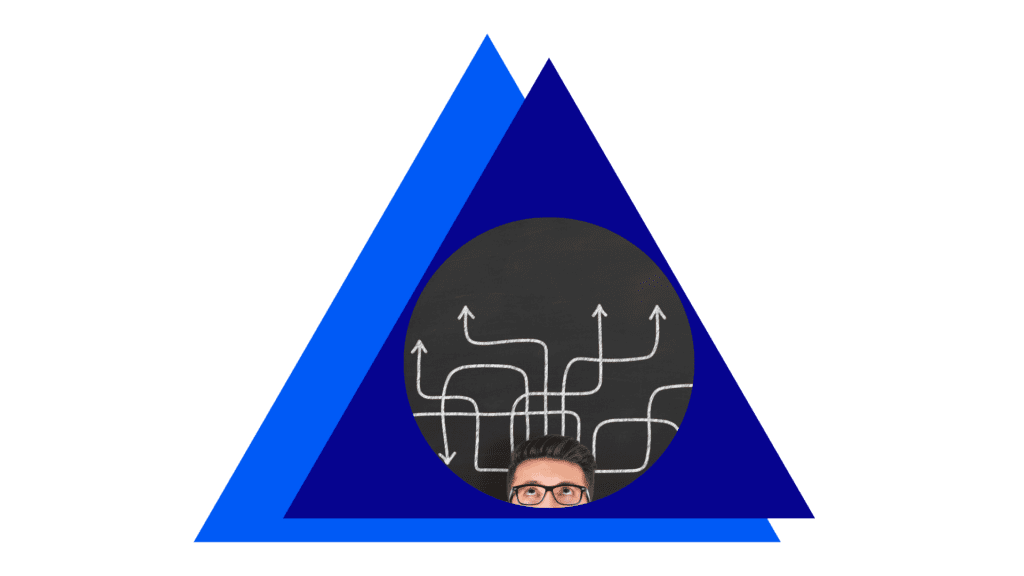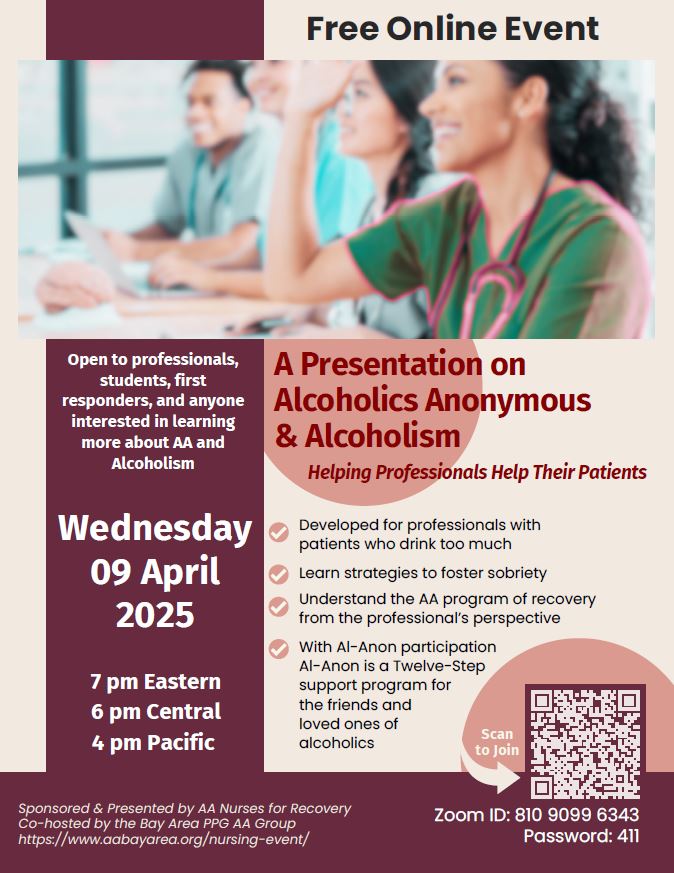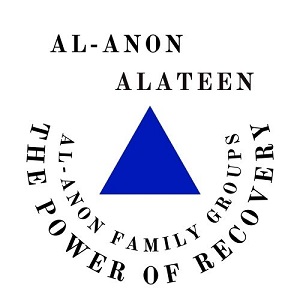
Healthcare Professionals &
Alcoholics Anonymous
Information and resources for alcoholism and AA for professionals on the front lines dealing with the still suffering alcoholic.
From Powerless to Powerful
Alcoholics Anonymous
We Can Help
If you or someone you know is having trouble with drinking or does not understand alcoholism, Alcoholics Anonymous offers an alcoholism recovery program designed specifically for those who cannot remain sober despite their best efforts.

How AA Can Help
Understanding Alcoholics Anonymous and the Path to Recovery
Helping healthcare professionals
Helping others to help active alcoholics find recovery serves the primary purpose of AA.
The Primary Purpose of Alcoholics Anonymous
To carry the message of recovery to the still suffering alcoholic.
Alcoholics Anonymous gladly accepts referrals
The original Alcoholics Anonymous Twelve-Step recovery program for alcoholism to help heal the alcoholic from the physical, mental, and spiritual illness of alcoholism. Some people refer to AA as a holistic approach, helping the sufferer find long-term sobriety by addressing the whole person.
The program of recovery based on the Twelve Steps includes the three legacies required for long-term freedom from alcohol addiction, Unity, Service, and the Program of Recovery.
AA is available in over 180 countries, and the primary textbook of AA has been translated into over 70 languages.
Members’ voluntary service and financial contributions support the individual AA Group and Organization. AA has resources available to help everyone better understand alcoholism.
The only requirement for membership in AA is a desire to solve the drinking problem.
The Meeting rooms of AA
Anyone is welcome at an open AA meeting. There are no fees or dues making AA a free resource for those in need.
Closed AA meetings are for those who describe themselves as alcoholics or those who may identify themselves as having a drinking problem
There are special interest meetings that provide support to professionals that must have absolute anonymity. There are meetings for special interest groups from women’s and men’s, as well as POC groups, the LGBTQ+ community, and young people meetings. ASL (American Sign Language) meetings are another resource for the hearing impaired, There are multiple meetings for non-English speaking alcoholics such as Spanish language meetings.
Virtual meetings are available every hour of the day giving the newcomer a wonderful resource in early recovery.
AA has no opinion
AA has no opinion on outside political or social issues, keeping the organization free of controversy. “If your drinking does not bother you it does not bother us”. AA takes no position on abstinence movements or public discussions concerning alcoholism or alcohol use. AA appreciates professionals and others recommending the AA Program. The AA Organization and Groups have a policy of cooperation but not affiliation. The only purpose is to help those who have not recovered from their addiction to alcohol.
AA is a Mutual Support Group
In earlier decades, AA was referred to by medical professionals and the press as a Mutual Aid Society. Today professionals refer to Twelve-Step Programs as Peer Support Groups (PSG’s) or Mutual Support Groups (MSG’s).
Medical professionals labeled the program of recovery in AA as the medical model of recovery as AA believes in the physical abnormality of those who have become addicted to alcohol.
“Unity” is one of the three foundational legacies of AA. Most recovery programs for alcoholism today recognize the importance of building a recovery community around the newcomer. “Reconnecting the disconnected”.
Those on the front lines
Medical professionals, law enforcement, social service providers, and paramedics are frequently the first responders and the first to help those afflicted and understand that alcoholism is not a moral failing, lack of character, or maladjustment to life.
Al-Anon Family Groups
The Al-Anon organization believes that alcoholism is a family disease. It is open to anyone concerned with someone’s drinking.
Al-Anon Family Groups also provide support for Alateen in many communities. Alateen is a great resource for teenagers who have been affected by someone else’s alcoholism. Providing support and relief by helping everyone better understand alcoholism.
Member’s voluntary service and financial contributions support the individual Al-Anon Group and Organization., as well
"At a certain point in the drinking of every alcoholic, he passes into a state where the most powerful desire to stop drinking is of absolutely no avail. This tragic situation has already arrived in practically every case long before it is suspected."
pg. 24 Alcoholics Anonymous

"Alcoholics are not bad people getting better, they are sick people getting well"
"It became more and more obvious to me and those around me, my earlier success' in education, career, relationships, life, did not prepare me for handing everything I cherished over to alcohol with the willingness of a child accepting its mother"
- Anonymous
Together We Can
Together We Can
Information is Power
AA Nurses for Recovery
A dedicated network of Alcoholics Anonymous members and healthcare professionals focused on empowering professionals to support those struggling with alcoholism.
Members of AA are committed to providing guidance, fostering understanding, providing resources, and promoting healing through shared experiences and insights, ensuring that individuals in the healthcare field can effectively aid those in need of recovery.
Nurses for Recovery hosts a virtual workshop once a quarter that is open to anyone interested in AA.
For more information on the workshop, click here.
Alcoholism does not discriminate
Dipsomania, Methomania, Chronic Inibriates, Alcohol Abuse Syndrome, Alcohol Addiction, Alcohol Abuse Disorder, Alcohol Use Disorder, Substance Use Disorder, Alcohol Dependence Disorder.
The name may change, but the disease left untreated, always kills.
Alcoholism is an illness that affects people of all ages, socioeconomic backgrounds, genders, abilities, orientations, nationalities, cultures, ethnicities, and beliefs. Loss of control for the alcoholic is not measured by how long one drinks or how much one drinks. AA defines alcoholism by one of two simple questions, can one control how much they drink when they drink, can the drinker stay stopped through self-will or determination. It is up to the individual to determine if they have a drinking problem or if they want help as well as sobriety.
The members of AA do not diagnose anyone, they do help the newcomer identify themselves as alcoholics.
Resources
Resources
Referral Materials and Information from Professionals
Letting our friends recommend us;
While AA was the original 12-Step Recovery Program for alcoholism it may not be for everyone. It has helped millions find freedom from their alcohol addiction.
The AA organization does not participate in studies, track members, or involve itself in scientific research. That has not kept universities, research organizations, or governments around the world from speculating about and studying the AA program to better understand how to help alcoholics and in turn help society.
The following resources are from AA and Al-Anon Family Groups, as well as experienced nonalcoholic professionals, and friends of AA interested in helping everyone better understand how to help those afflicted with alcoholism.
Four short videos featuring professionals and their experience with AA

"Does AA Work" Study of AA

Professionals & AA

AA World Service.
AA & Professionals

Al-Anon World Service. Professionals
AA & Al-Anon Resources
- AA Professional Information
- A.A. as a Resource for the Health Care Professional
- AA. A member's eye view.
- AA at a Glance
- AA Meetings by City and State
- Alcoholics Anonymous World Service
- Al-Anon Fact Sheet for Professionals
- Al-Anon Professional Information
- Al-Anon Meetings by City and State
- Alateen Resources
- Alateen Freqently Asled Questions
- Al-Anon World Service
Professional Recovery Resources
- What makes AA work, Harvard
- AA, most effective path to alcohol abstinence, Stanford
- AA and other 12‐step for AUD and Addictions, Cochrane
- CRP’s; Association of Recovery in Higher Education.
- Understanding Alcohol Use Disorder NIAAA.NIH.gov
- Fact & Statistics Alcohol use U.S. NIAAA.NIH.gov
- Alcoholics Anonymous Effectiveness, NIH.gov
- ASAM; American Society of Addiction Medicine
- SAMHSA: Resourse information.
- Heavy drinkers are not necessarily alcoholics, Harvard
- Doctors’ Hesitation in Prescribing Addiction Treatments
- National Institute: Destigmatizing AUD Among Nurses
The book Alcoholics Anonymous which includes the program of recovery, is available in PDF or purchase a copy

Stock photos.
Membership in AA is unknown.
In AA, our experience is that none of us can recover alone, but together we can.
Members get sober by working the Twelve-Step program; they stay sober giving back what was given freely.
How aa views alcoholism
“We alcoholics are men and women who have lost the ability to control our drinking. We know that no real alcoholic ever recovers control. All of us felt at times that we were regaining control, but such intervals – usually brief – were inevitably followed by still less control, which led in time to pitiful and incomprehensible demoralization.”
– Alcoholics Anonymous, p. 30
The explanation that seems to make sense to most A.A. members is that alcoholism is an illness, a progressive illness, which can never be cured but which, like some other diseases, can be arrested. Going one step further, many A.A. members feel that the illness represents a combination of a physical sensitivity to alcohol and a mental obsession with drinking, which, regardless of consequences, cannot be broken by willpower alone.
– A.A. as a Resource for the Health Care Professional
“Physicians who are familiar with alcoholism agree there is no such thing as making a normal drinker out of an alcoholic.”
– Alcoholics Anonymous p. 31*
*The definition of alcoholism as defined by the American Society of Addiction Medicine and the National Council on Alcoholism and Drug Dependence:
“Alcoholism is a primary, chronic disease with genetic, psychosocial, and environmental factors influencing its development and manifestations. The disease is often progressive and fatal. It is characterized by impaired control over drinking, preoccupation with the drug alcohol, use of alcohol despite adverse consequences, and distortions in thinking, most notably denial;
Each of these symptoms may be continuous or periodic.”
Join Our Live Event
Presentation of AA & Al-Anon
Q & A with Nurses and Healthcare Professionals in Recovery

Free Event
All First Responders Welcome
Students
Healthcare Professionals
This Event is Quarterly
This event will be held on Jan. 8, 2025/ April 9, 2025/ July 9, 2025
This event is to help those on the front lines better understand how to help the still suffering alcoholic.
This event is hosted by nurses and other professionals in the healthcare profession, it is open to anyone interested in learning more about AA and Alcoholism.
Recovery
For more Information and detailed descriptions
Outreach Services offered by AA.
Alcoholics Anonymous has a rich history of cooperating with various external organizations. Their service committees include members who are ready to share information about AA and engage with individuals struggling with alcohol issues.
For more than 80 years, AA members have partnered with doctors, healthcare professionals, therapists, spiritual leaders, law enforcement, court officials, educators, social workers, and addiction counselors—essentially anyone who encounters problem drinkers in their professional roles.
If you would like to arrange a presentation for your group or organization, please fill out a short contact form. We will arrange to have someone reach out to you.

Stock photos.
Membership in AA is unknown.
“I no longer had to drink against my own self-will. “
– cofounder, Alcoholics Anonymous
Treatment or AA
As often referred to, Alcoholics Anonymous (AA) is frequently used as an aftercare program by many addiction treatment and recovery centers. A program plays a crucial role and resource, supporting individuals on their journey to long-term sobriety.
Professional treatment for alcoholism can be highly beneficial for many individuals. The structured environment, support, and safety provided by treatment centers frequently mark the beginning of long-term sobriety for countless recovered alcoholics. Many treatment programs strongly encourage participation in Twelve-Step recovery programs, such as AA. Nonprofit organizations like The Betty Ford Foundation are founded on the guiding principles of AA, offering a variety of support help. However, the key to long-term sobriety lies in building a recovery community around the individual and equipping them with tools to navigate life in a recovered state.
Detox and Medical help.
Assistance by professionals during detox is always recommended, as alcohol withdrawal can be life-threatening. Medical professionals understand the critical need for support during the first few hours and days after an individual stops drinking, ensuring their safety and well-being.
While the initial days of sobriety can be challenging, remember that AA offers substantial support. Adhering to the AA program of recovery can alleviate many of the emotional and mental symptoms associated with alcoholism, helping individuals maintain their sobriety and improve their overall quality of life, as frequently demonstrated.
Religion, Spirituality, Myths About AA
No affiliation.
One misconception about AA is that it is a religious program or even a cult. AA has no dogma and no spiritual leaders.
The AA organization is neither affiliated with nor endorses any religious belief or dogma. Members of AA range from staunch atheists to the most ardent religious devotees from every denomination, sect, and culture.
AA does not tell anyone what to believe in. It is suggested that you develop an open mind.
Spirituality in AA.
A spiritual program is suggested, where spirituality is determined by the member and can be as simple as discovering one's own truth. Meditation is one of the Twelve-Steps, and many who suffer from addiction find it vital to recovery.
A key component of AA’s approach is its emphasis on spirituality. Importantly, spirituality within the AA framework is determined by the individual, making the program accessible and acceptable to people from all walks of life, regardless of their personal belief systems.
Outreach to Professionals.

Stock photos.
Membership in AA is unknown.
AA members and service groups are encouraged to reach out to their local professionals.
Recovered alcoholics understand the importance of service and outreach to others.,
AA members often embrace the term “alcoholism,” expressing gratitude for the lessons learned through sobriety and surviving a deadly disease. Phrases like “I am a grateful alcoholic” are common at AA meetings.
Many believe that their experience with alcoholism provided profound self-understanding and awareness of their impact on others and society.
For Professionals
Professionals in AA:
For professionals seeking help with a drinking problem, it is important to understand that the majority of AA members maintain their jobs and professions while participating in the program. Unfortunately, some individuals have experienced significant losses, but with the proper support and the tools provided by the AA program of recovery, they can rebuild their lives.
Professionals on the Front Lines:
Professionals who work with or encounter alcoholics share a common goal with Alcoholics Anonymous: helping individuals stop drinking and lead healthy, productive lives. AA members offer valuable personal experience with recovery, and experts in the field recognize the importance of an ongoing support system for those in recovery.
AA Service Committees:
The AA organization maintains service committees with members trained to engage with professionals, helping the broader community better understand alcoholism and the AA program of recovery.
Is AA Still Relevant After 80-Plus Years?
The book “Alcoholics Anonymous” does not support the idea that alcoholism has a single cause. Many individuals start drinking in response to life’s challenges, while others may drink moderately for years before suddenly losing control. Within AA, there are many alcoholics who cannot trace their loss of control to any specific circumstance or life event.
However, the basic text of AA aligns with many concepts recognized by addiction medicine experts, acknowledging that alcoholism can lead to numerous physical and mental health issues.
The Al-Anon Family Groups
The Al-Anon organization believes that alcoholism is a family disease.
Al-Anon Family Groups also provide support for Alateen in many communities. Alateen is for teenagers who have been affected by someone else’s alcoholism.

The Whole Family Deserves Recovery
Alcoholism frequently affects the loved ones of alcoholics. Al-Anon uses the shared experience of its members to help newcomers better understand alcoholism, and find support from others who have faced similar experiences.
Al-Anon Family Groups is a Twelve Step Program of recovery. Members are made up of people concerned with someone’s drinking problem.
Starting with the first gatherings of alcoholics in 1935, before the group or organization had a name, the families of alcoholics were meeting and sharing their experiences with their loved ones.
Loved ones joined their alcoholic family members in their gatherings and together, they sought out ways to support sobriety for the entire family.